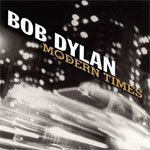
Bob Dylan Modern Times
(Columbia)
I was only about 30 seconds into Modern Times when I realized that Bob had done it again; his second triumvirate was complete. His first, which famously ran through an amazingly (and anything but modern) brief period from 1965 to 1966, cemented his reputation forever as the man who spoke the language of his time in the musical grammar of his time: pop music. The passage of the years has confused his status as the "voice of his generation" by melding his somewhat self conscious early protest lyrics with his more influential period as a pop star. But in fact Dylan remains relevant today for his greatest accomplishment - freeing pop music lyrics from the strictures of meaning. Ultimately, this is what spoke to audiences in the mid 60's and what speaks to us today in these increasingly chaotic and spiritually adrift times.
Dylan does for music what Pynchon does for literature. Along the way there will be sadness, bitterness, joy and a whole lot of jokes, but in the end you'll have no idea what it was all about and that's perfect because that's life. I'm not going to run through his 40 year career but suffice it to say that he has been most successful working in this idiom, and it's what has breathed life into his most recent three albums starting with Time Out of Mind. Another key, and much overlooked, element of Dylan's success has been his backing bands, and he happens to have an excellent one now. I've seen these guys live a couple of times and they kick ass. Last time out, on Love and Theft, they displayed their ass-kicking abilities on great tunes like Honest with Me and Lonesome Day Blues. This time they're much more relaxed but no less assured. The upbeat tunes don't rock as hard but they don't have to because the grooves are deeper and they draw you right in.
Thunder on the Mountain kicks it off swinging. Tell me, how does one resist a song with a line like this - "gonna raise me an army some tough son's a bitches, I'm recruitin' my army from the orphanages"? This is Dylan at his funniest, effortlessly reeling off one-liners like a vaudeville comic. From there, he mines every genre of homegrown American music of the 20th century to set against his world weary voice and words whose "wisdom rose up in strife", as he sings on When the Deal goes Down. Bob's lightest touch and most devastating blows appear on the wonderful Workingman's Blues #2. Wages are down, relationships are strained and some people, the powerful, "don't know what work even means". Dare I say it, but this sounds like, gasp, a protest song! It is, but it isn't, which is why it is great. Pedantry can't hold a candle to resignation.
The guitar playing on this album is nothing short of brilliant. Check out the subtle octaves on The Levee's Gonna Break, or the repeating blues figure on Someday Baby, or the slide guitar work on Rollin' and Tumblin'. People focus on his lyrics because there's so much to wonder over, but one can't overlook his ability as an old school tunesmith, a "song and dance man" as he once referred to himself. Like Shakespeare with his actors, Dylan gives his interpreters, his musicians, a lot to work with and room to move.
As usual, you could write a research paper on Dylan's use of American myth and mystery to obliquely address our current crisis. Hell, you could even write a book, like Greil Marcus did on the spectacular Basement Tapes. And if there are any stubborn folks out there still whining about Dylan's increasingly limited vocal range - Get the hell over it! Genius doesn't need to hit a high C. I'm here to tell you to buy this album, because it's brilliant, wistful, funny, resigned, angry, chilling, romantic, and most of all, swings like a somanabitch.
1 October, 2006 - 23:00 — Alan Shulman